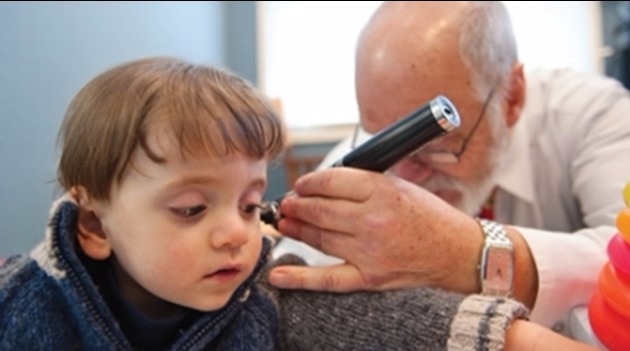
Interview with Dr. Subash Rao: Hearing assessment for babies
4 Feb 2016 | 4 min Read
Baby Chakra
Author | 501 Articles
Why is it important to be done?
It is important to assess hearing loss as early as possible, because babies start learning how to use sound as soon as they are born. Listening in the first months of life, prepares babies to speak. Babies learn to talk by listening to their families talk around them. Imagine that a baby has a hearing loss, but is not identified. This can lead to slow development of speech and language. These delays can lead to problems in school later on. Finding hearing loss early can help prevent delays in speaking and learning.
Expected response to sounds as your baby grows (hearing milestones)
At birth: blinks eyes to loud sound (door closing etc.)
At 1 month: notices sudden prolonged sounds like the noise of a vacuum cleaner and may turn towards the noise.
At 4 months: Quietens / Smiles at Parents voice. May turn head towards unseen Parents
At 7 months: turns head immediately to Parents voice
At 9 months: listens carefully to every day sounds/familiar sounds. Searches for quiet “out of sight” sounds
At 12 months: Responds to own name
If at any stage in the baby’s or child’s development you think he/she may have difficulties hearing, contact your Paediatrician immediately.
What are the sounds a baby should make as it grows?
4 months: Makes soft sounds when awake. Gurgles and coos.
6 months: Starts to make sing-song vowel sounds (e.g.: a-a, muh, goo, der, aroo, adah).
9 months: Babbles (e.g. ‘dada da’, ‘ma ma ma’, ‘ba ba ba’)
12 months: Babbles loudly, often in a conversational-type rhythm. May start to use one or two recognizable words.
15 months: Makes lots of speech-like sounds. Uses 2-6 recognizable words meaningfully (e.g.: ‘teddy’ when seeing or wanting the teddy bear).
2 years: 2 word sentences (e.g.: I want)
3 years: 3 word sentences (e.g.: give me water)
What is Newborn hearing screening?
The newborn hearing screening test helps to identify babies who have permanent hearing loss as early as possible. It ensures parents can get the support and advice they need right from the start.
One to two babies in every 1,000 are born with permanent hearing loss in one or both ears. This increases to about 1 in every 100 babies who have spent more than 48 hours in intensive care. Most of these babies are born into families with no history of permanent hearing loss.
Permanent hearing loss can significantly affect a baby’s development. Identifying these babies early gives a better chance of developing language, speech, and communication skills.
When is the newborn hearing test done?
These tests can be done within the first few weeks of birth of the baby. Infact, it can be done even before the baby is discharged after the delivery.
How is the newborn hearing test done?
The first test is called OAE (Otoacoustic Emissions)
If the baby passes this test, it means the hearing apparatus of the baby is normal.
However, if a baby fails this first OAE test, it does NOT necessarily mean that he or she has a hearing loss because it is not always possible to get clear responses from the first test. It could mean:
• The baby was unsettled when the test was done
• There was background noise
• The baby has fluid or a temporary blockage (due to vernix) in their ear
Of course it may also mean that the baby may be having a problem in the hearing apparatus.
If the baby fails the first OAE test, then it will be offered a second test within a month’s time. This may be the same as the first test (OAE) or another type called the BERA (Brainstem evoked response audiometry).
If the second test (BERA) too shows a hearing deficit, then the baby will require early intervention to assist the hearing and speech development.
To consult Dr Subash Rao in person, click here.
A


Related Topics for you
Suggestions offered by doctors on BabyChakra are of advisory nature i.e., for educational and informational purposes only. Content posted on, created for, or compiled by BabyChakra is not intended or designed to replace your doctor's independent judgment about any symptom, condition, or the appropriateness or risks of a procedure or treatment for a given person.
